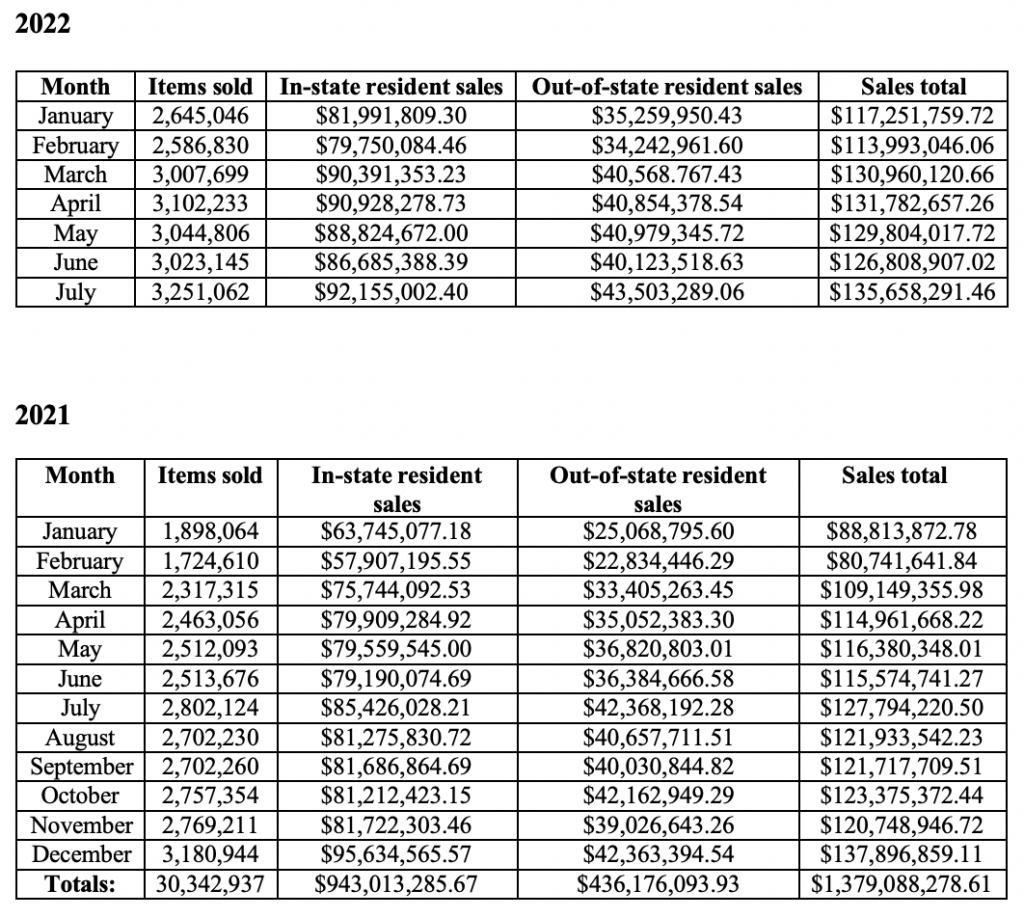Business
Illinois Marijuana Sales Hit $135 Million In July, Second Highest Total Since Adult-Use Market Launch

Illinois retailers sold more than $135 million worth of adult-use marijuana in July, the largest monthly sales total so far in 2022 and the second biggest month since sales first launched, the Illinois Department of Finance and Professional Regulation (IDFPR) announced on Wednesday.
While the July sales figure is still about $2 million less than the state’s December 2021 peak, it’s a sizable monthly total during a year that saw cannabis purchases lag over the first few months.
Illinois marijuana shops sold 3,251,062 cannabis products worth a collective $135,658,291 in July. About $92 million in marijuana sales came from in-state residents, while $44 million was purchased by out-of-state visitors.

Via IDFPR.
Interestingly, while the July sales numbers are somewhat lower than the December 2021 total, more individual cannabis items were sold last month than in December. That could signal developing trends, such as shifts in marijuana pricing or evolving consumer preferences for certain products.
Medical cannabis sales figures are reported separately by a different state agency, and aren’t accounted for in the new recreational data.
Gov. J.B. Pritzker (D) recently touted the state’s marijuana sales and resulting tax revenue for the 2022 Fiscal Year. Illinois collected $445.3 million in tax dollars from $1.5 billion in cannabis sales during that period. That’s a 50 percent increase is cannabis tax dollars compared to the prior fiscal year.
Local governments received $146.2 in cannabis tax disbursements in the latest fiscal year, up 77 percent from the prior year.
While 2022 recreational marijuana sales have been generally stable since the December peak, that trend could change demonstrably since officials approved new social equity marijuana retailer licenses last month, representing what will be a significant expansion in the number of dispensaries once those businesses become operational.
The governor and other state officials have emphasized that they’re committed to ensuring that portions of tax revenue from the marijuana market go toward community reinvestment, as prescribed under the state’s legalization law.
In June, Illinois officials announced that the state is awarding $45 million in grants funded by marijuana tax dollars to support community reinvestment in areas “hardest hit by the failed war on drugs.”
That marks the second round of funding that’s being made available through the state’s Restore, Reinvest, and Renew (R3) program, which was established under Illinois’s adult-use cannabis legalization law.
Last year, state officials also put $3.5 million in cannabis-generated funds toward efforts to reduce violence through street intervention programs.
From last year’s sales, Illinois generated almost $100 million more in tax revenue from adult-use marijuana sales than from alcohol in 2021, state data found.
While state officials have consistently voiced their commitment to equity, legalization’s rollout hasn’t been without hiccups and frustration among would-be licensees. Illinois regulators have faced legal challenges over the way social equity licensing applications have been managed, with complaints about the lottery system that the state later said it would work to resolve.
A court order prohibited the state from approving additional recreational cannabis shops for nearly a year before that decision was lifted in May. With the ban removed, officials announced late last month that they accepted new marijuana retailer licenses for social equity applicants.
In addition to providing community reinvestment funding, the governor announced in 2020 that his office had processed more than 500,000 expungements and pardons for people with low-level cannabis convictions on their records.
Pritzker also recently signed a bill that will make it so courts cannot deny petitions to expunge or seal records based on a positive drug test for marijuana.
A state-funded initiative was also recently established to help residents with marijuana convictions get legal aid and other services to have their records expunged.
It’s these types of initiatives that Toi Hutchinson recently told Marijuana Moment that she’s most proud of as she transitioned from being Pritzker’s cannabis advisor to the president of the national advocacy group, the Marijuana Policy Project (MPP).



